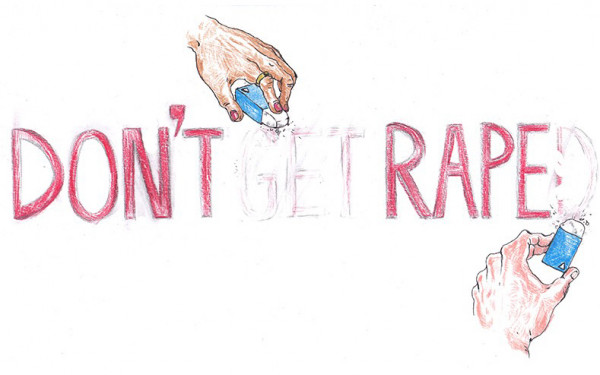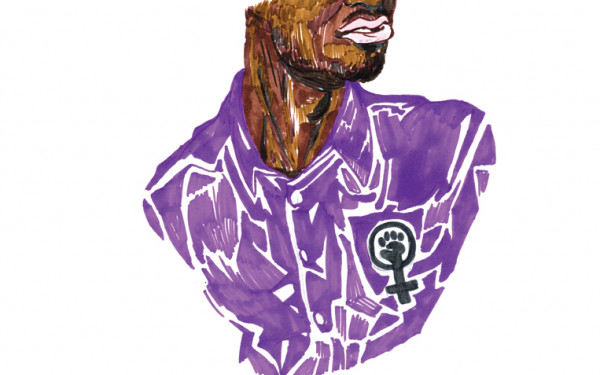Glen Canning Says the RCMP Failed his Daughter Rehtaeh
Another Word for Gender Keynote Speaker Sees Lack of Consent Education
In the packed ballroom of the Students’ Society of McGill University, over 300 people sat and listened to the story of Rehtaeh Parsons, as told by her father Glen Canning. It was the first time Canning had spoken in front of a large group of people since his daughter’s death in April.
His keynote speech gave a rare look into the person Rehtaeh was—a straight-A student from Cole Harbour, Nova Scotia who loved animals. He remembers how his daughter would always bring little critters into the house, and how she once made him spend over $100 on a stray cat that immediately bolted.
He remembers a pug they adopted together from the SPCA, which he says was her last gift to him.
Although the story of Rehtaeh being sexually assaulted—and the bullying that followed for two years until she took her own life in April at 17-years-old—has often been told in the media, Canning went through it slowly and in far more detail.
Canning said Rehtaeh had always wanted to be a scientist or veterinarian before becoming tormented by her peers.
After seeing how no one in the justice system could help her, she wanted to become a lawyer. He dispelled notions that his daughter had gone to a party the night of her assault, and that she came from a broken home.
Canning also recounted his experience with the police investigation into the sexual assault of his daughter, and what he sees as failings of the Nova Scotia RCMP to do real police work.
“[Rehtaeh] was not just raped, she was humiliated and destroyed,” said Canning.
Canning’s story is a hard one to hear: of how the school system and police volleyed the issue back and forth, of the victim-blaming Rehtaeh went through for two years following the assault and how her parents still face similar harassment today.
“There are people who believe Rehtaeh shouldn’t have been there, that it was her fault. And that’s classic victim-blaming,” Canning told The Link in an interview the day before his speech. “In messages I receive online they’ll openly say this was my fault for not raising my daughter properly, but they won’t say anything about the people who raped her or their parents.”
It’s an example of what Rehtaeh had to deal with, and what survivors of sexual assault face when they consider coming forward.
“That kind of message is directly responsible for [how] nine out of 10 women who have been sexually assaulted won’t say anything,” said Canning.
At his hour-long speech in Montreal, the crowd of mostly young women listened in silence. The Concordia University-based Centre for Gender Advocacy’s Peer Support volunteers sat in the back of the room, wearing big pink hearts, ready to help anyone who needed to talk about what they were hearing.
Canning’s story was the keynote speech for the Centre’s Another Word for Gender event series. The theme of this year’s series was finding men’s place in feminism.
“Rehtaeh Parsons Was My Daughter”
The night of her assault in 2011, Rehtaeh was staying with a friend from school.
The two girls went over to a boy’s house, who had invited other boys who brought a bottle of vodka. Because they were minors at the time, the boys cannot be named.
Canning said his daughter woke up the next morning at the house, unsure of where she was. She asked one of the boys for a cigarette and walked home.
Days after the assault, Rehtaeh saw the picture that was being shared around her high school, showing one of the boys giving the camera a “thumbs up” sign while having sex with her as Rehtaeh’s head was out the window.
After her death two years later, Rehtaeh’s mother Leah Parsons received a Facebook message from one of the boys, depicting the night’s events.
The message recounts that Rehtaeh was so drunk she couldn’t walk, that she had to be carried to a bedroom. Canning says the police report has photographs of his daughter’s bruised wrists.
The message goes on to depict Rehtaeh, unable to walk and vomiting, having her head put out the window. A first boy has sex with her, as does a second, who is pictured behind Rehtaeh in the photo that would soon be spread around Cole Harbour.
She was later brought to another boy’s room, where he was left alone with her. The Facebook message writes that he left the room with a smirk on his face.
“One of the boys who raped my daughter Rehtaeh admitted that while he was having sex with her, she was vomiting and essentially unconscious,” said Canning of the boy who sent the message.
The message ends with the boy pleading to Rehtaeh’s mother that she has to understand that he did not rape her daughter.
“I believe he actually believes he didn’t rape her,” said Canning during the interview. “That’s the state of consent right now.”
The Facebook account was deleted soon after, but Leah had taken a screenshot of the message
However, police said that the message could not be used as evidence because they couldn’t prove it was that boy typing out the message.
“That’s your job to find out,” said Canning at the talk. “That’s police work. You’re not paid to make assumptions.”
“Educating This Away”
Canning says the case illustrates how ill-prepared the police were to deal with sexual assault involving high school students.
Rehtaeh suffered a nervous breakdown soon after learning of the photo. Her parents called the crisis hotline and she spoke to the RCMP.
A sexual assault case was opened, but after a year they called to say the case would be closed and no charges would be laid.
The police never spoke with any of the boys who were in the house that night, and the mother who lived there declined to give a police statement.
The RCMP said Rehtaeh’s testimonial contradicted what she had initially told police, that she hadn’t remembered saying “no” when giving her first statement.
During his speech, Canning says the RCMP were talking with the attorney general, who likely told the police there was not enough evidence to win the case.
“It’s horrifying to look at those numbers,” said Canning of the low conviction rate in sexual assault cases.
Canning said the RCMP also had said they would come into Rehtaeh’s school to speak to students about consent, but that never happened.
He spoke of a girl Rehtaeh had later met, who said one of the boys had done the same thing to her. Despite his daughter’s pleas, Canning said the girl would not come forward.
“That’s something I lay at the feet of the RCMP in Halifax,” said Canning.
Two of the boys are currently facing charges of child pornography for distributing the photo of Rehtaeh taken the night of her assault.
“They’re not learning anything from this,” said Canning. “They’re kids, that’s just sex.”
A lack of education, from what real consent is to the power and permanence of
social media, is what Canning hopes can be fixed leading from this tragedy.
“I don’t believe in legislating this away, I believe in educating this away,” said Canning to applause during his speech.
In his interview with The Link, Canning highlighted the need for consent to be discussed in sexual education courses, and said work must be done to combat media imagery that depict women as “objects to be conquered.”
This, combined with kids having access to media technology their parents don’t fully understand, has lead to a deadly environment for young people growing up today.
“I know right now if your kid is being terrorized and tormented online, the police will say it’s not a police matter, the school will say it’s not a school matter, and you’re left on your own,” said Canning.
“No one would do anything, no one did a thing. That, more than anything, destroyed our child’s life.”
Telling the story of his daughter has become Canning’s work; the only way to bring some semblance of justice is to get a conversation started about how sexual assault survivors are treated in Canada—to “admit it’s broken.”
Canning is also working to have a sexual assault centre opened in Cole Harbour in his daughter’s name.
“We can’t remain silent about this. I saw what it did to my child, and I’m never going to shut up about it,” said Canning.
“I know there’s injustice going on right now.”

_900_600_90.jpg)
_600_832_s.png)

1_600_375_90_s_c1.jpg)


